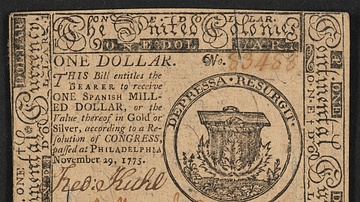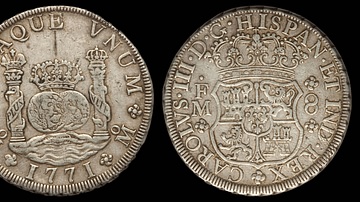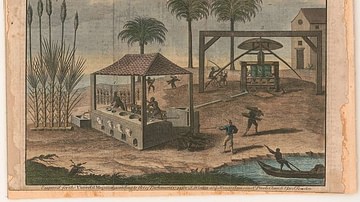Search
Remove Ads
Advertisement
Summary 
Loading AI-generated summary based on World History Encyclopedia articles ...
Search Results

Article
Colonial American Currency
Colonial American currency was a work in progress from the time of the earliest English settlements of the 1600s until the United States of America minted its own money in 1783. The monetary system was far from standardized, and trade within...

Collection
The Real Pirates of the Caribbean
The real pirates of the Caribbean operated during the Golden Age of Piracy (1690-1730) terrorizing merchant ships and colonial ports to grab gold, liquor, and any cargo they fancied during their adventurous but almost always short careers...

Image
Silver Continental Dollar, 1776
A silver Continental dollar, minted in 1776. This currency is thought to have been designed by Benjamin Franklin and minted by Elisha Gallaudet at a private mint in Freehold, New Jersey. This early run of coins was produced for approval...

Definition
Dutch East India Company
The Dutch East India Company (VOC) was formed in 1602 by the Staten-Generaal (States General) of the then Republic of the Seven United Netherlands. The company was granted a 21-year charter with rights to trade exclusively in Asia and to...

Image
Eight-Dollar Continental Bill, 1775
An eight-dollar bill minted by the Continental Congress in 1775. Collection of the Baker Library, Harvard Business School.

Image
Spanish Silver Dollar, 1771
Spanish silver dollar from the reign of Charles III of Spain (r. 1759–1788). Minted in Mexico, under the authority of the Kingdom of Spain, 1771.

Definition
Near East
The Near East is a modern-age term for the region formerly known as the Middle East comprising Armenia, Cyprus, Egypt, Iraq, Iran, Israel, Jordan, Lebanon, Palestine, Syria, and part of Turkey, corresponding to ancient Urartu, Mesopotamia...

Article
Sugar & the Rise of the Plantation System
From a humble beginning as a sweet treat grown in gardens, sugar cane cultivation became an economic powerhouse, and the growing demand for sugar stimulated the colonization of the New World by European powers, brought slavery to the forefront...

Image
The Spanish Main and Caribbean Pirate Havens c. 1670 - Trade, Treasure, and the Golden Age of Piracy
This map illustrates the maritime routes of Spain’s Treasure Fleets and the network of Caribbean ports and pirate havens around 1670. It captures the tension between imperial commerce and maritime raiding, showing both the logistical arteries...

Definition
Spanish Main
The Spanish Main refers, in its widest sense, to the Spanish Empire in the Americas from Florida in the north to the northern coast of Brazil in the south, including the Caribbean. The term was initially more limited and referred only to...